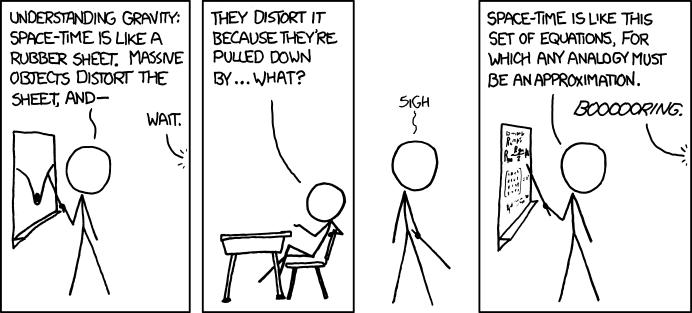1. By coincidence, I was involved in two unrelated conversations at work where the person I was speaking with dismissed the idea of global, man-made climate change/warming (whatever poorly marketed descriptive term you wish to use) in this manner:
I just don't think we should make policy and harm our economy based on bad science. I mean "the hockey stick"? Come on!
2. I was driving my 8-year-old somewhere, and she began telling me what she learned in class about the environment:
When you drive, the gas from your car goes into the ocean and pollutes the moisture; then the moisture from the ocean pollutes the water we drink. And that's like drinking gas.
3. Then this morning I enjoyed this XKCD comic:

These three ideas caused a glimmer of Truth to flicker in my admittedly thick cranium - that glimmer being that despite having the science horribly wrong, the 3rd Grader was basically correct: driving cars does cause environmental damage. She's dead wrong on the mechanisms at work, the chemistry, and even the vocabulary ("pollutes the moisture"?); and she's got no idea what the relative impacts of auto emissions on the hydrological cycle might really be. But car exhaust does have an effect on the planet - and some rough guesses (based on data available at http://cta.ornl.gov/cta/) indicate that there are about 62 million cars which might be operated on any given day. So, her basic premise is essentially true.
Of course, what will the 3rd Grader learn if you try to correct her science? (See the last panel of the cartoon again.)
But this is the nature of the "debate" I see going on regarding the impacts that mankind has on our complex systems of atmosphere, water, and biodiversity. Those of us who aren't scientists have to have this stuff explained to us - I don't do the research, I don't have a degree, and I have an admittedly imperfect understanding of what I am told. And when I try to talk about it - especially when I try to figure out what information CAN be trusted in this discussion - I feel like the 3rd Grader being challenged by the skeptical student from the cartoon.
In other words, the more I read and try to figure out "ground truth" in the whole Global Warming discussion, the more I see people dismissing the real science offered by the "professor" because of the poor understanding the other students have of the issue. And that gives me an uncomfortableness.
It seems to me that if everyone who claimed to be interested in a rational approach took a rational approach, we could quickly establish what the "facts" are: that there are a LOT of people on the planet, and that their various activities have a complex, but calculable impact on said planet; that the sum of these activities *might* be causing problems that could put us in danger; and that there might be some choices we could make that would mitigate these dangers. Most scientists agree with the first fact. Even the scientists I have seen cited as "global warming skeptics" don't question that mankind is causing rising temperatures; and then there are the doubters who actually DO their own research and convince themselves in the process.
There are plenty of folks in the general public who will refuse to concede any ground because they see this as a political issue; but the "wacky liberals" are in the company of rational conservatives on this one, and even the solution that our politically motivated deniers attack most aggressively was first implemented by one of their own. I have found that these facts won't protect you from the scorn of those who insist there is no consensus, and that by buying into the idea that humans are damaging their own habitat you are falling victim to the money-making machinations of a vast, environmentalist cabal.
(One has to wonder how the non-profit environmentalists intend to make all of this money, but if one can ignore the multi-billion dollar oil industry's interest in promoting this conspiracy theory, then I suppose one can just as easily find that motive. I think it goes deeper than just the oil companies, though.)
I don't expect anyone to take my word for any of this. The discussion is all Out There - and I'm just a poor 3rd Grader trying to make sense of it. I can recommend a guide to the talking points. I can offer my opinions, and my poor approximations and explanations. But in the end, not understanding the real costs and the real damage that we are doing will most likely cost more than any steps we might try to take to avoid them.
I just hope our skeptical students will give their professors the opportunity to explain it.
More on this subject here: http://scienceblogs.com/insolence/2011/05/motivated_reasoning_and_the_anti-vaccine.php
ReplyDelete